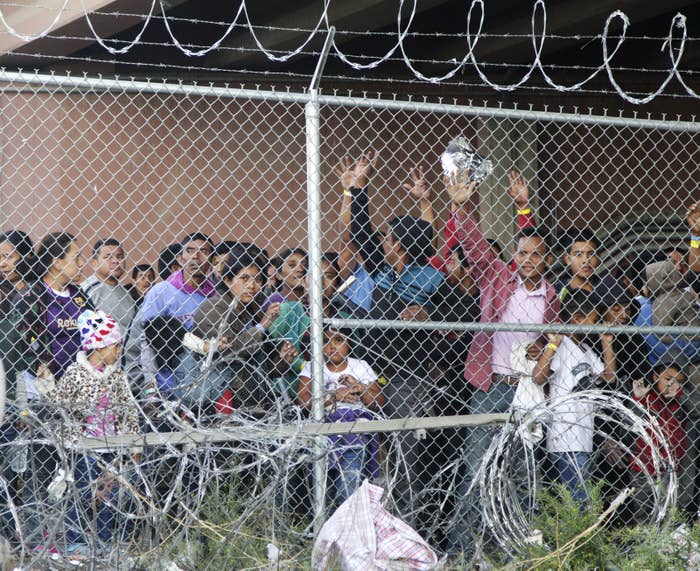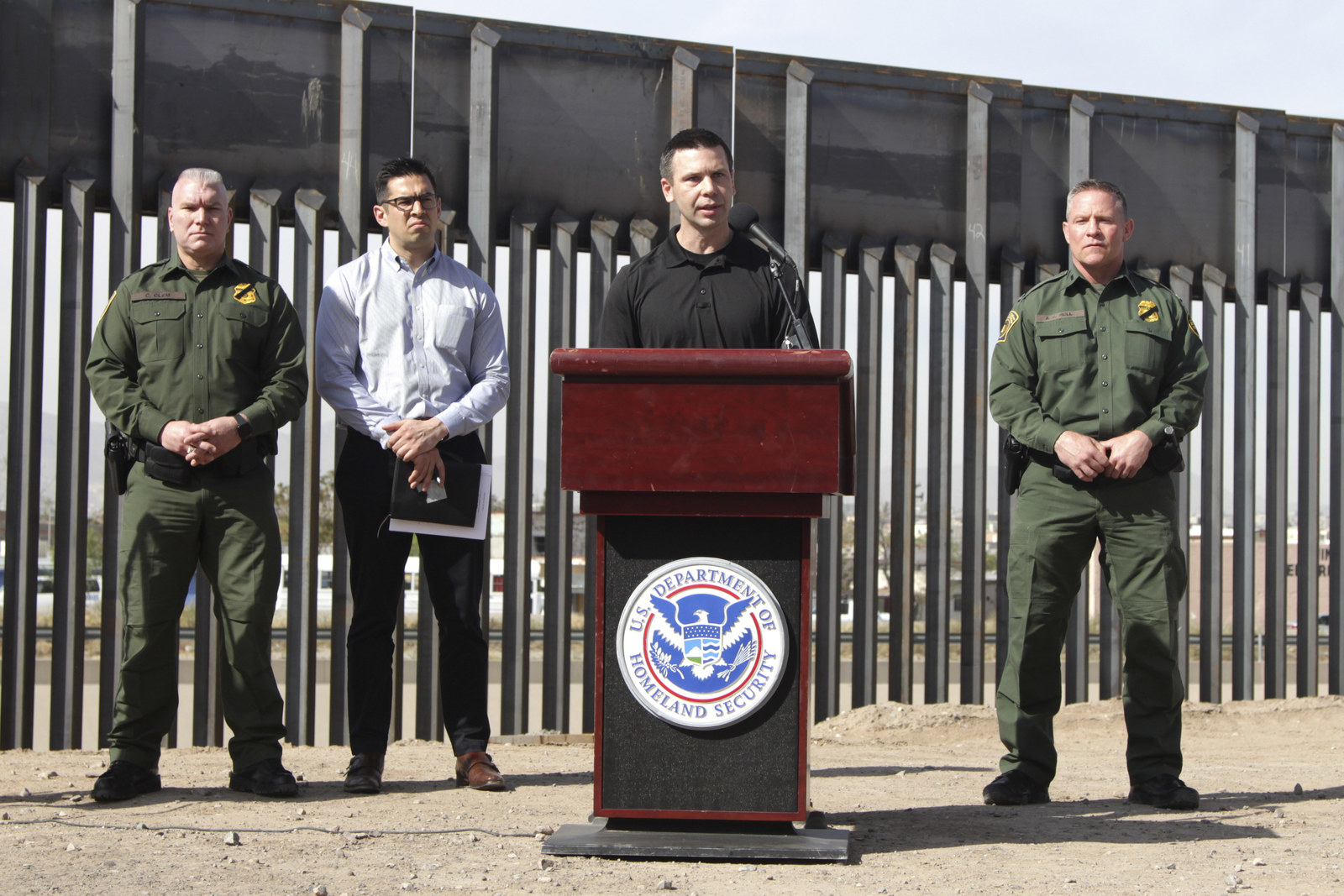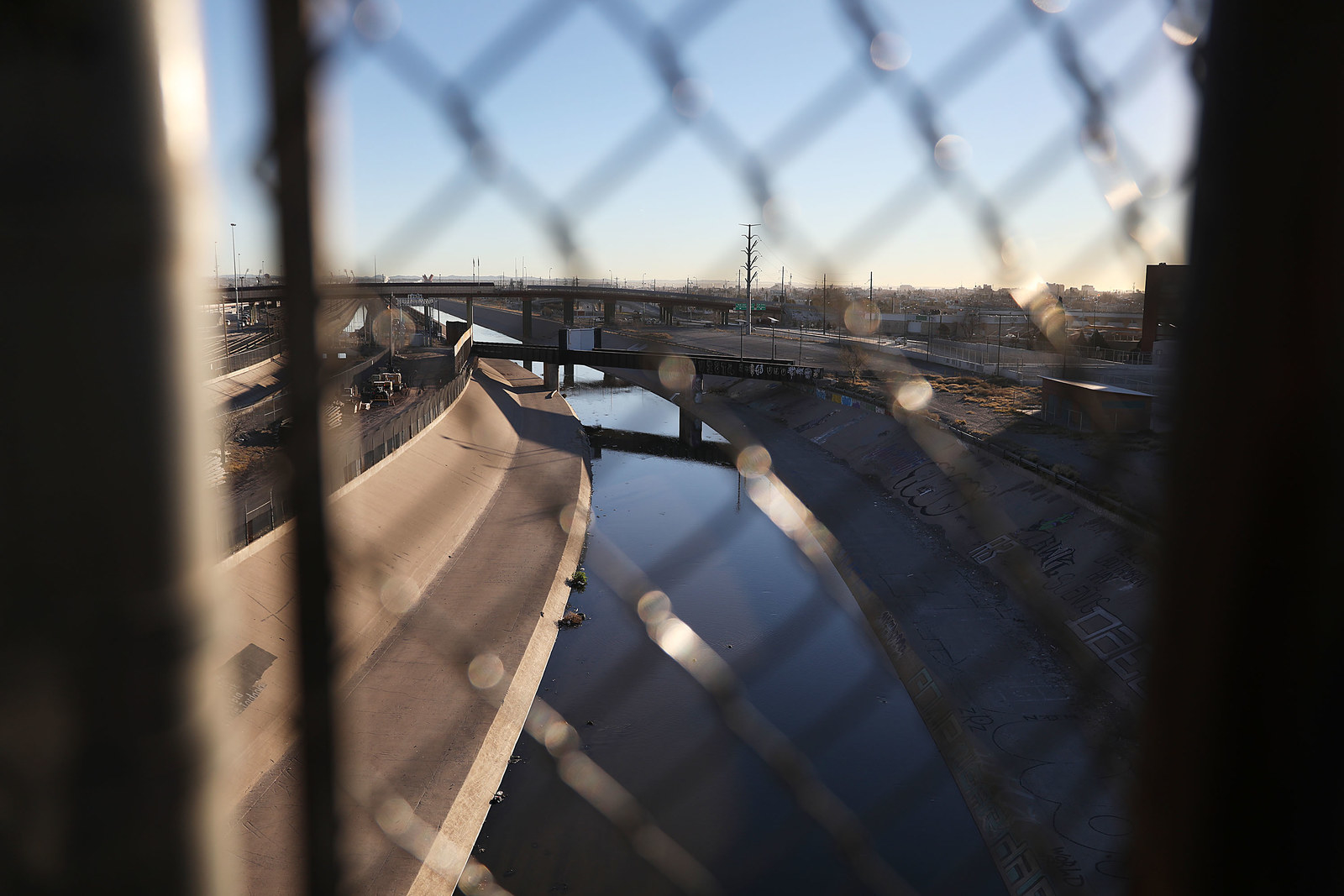
The head of Customs and Border Protection on Wednesday said his agency was facing a humanitarian crisis at the southern border, as immigrant families are being held in a makeshift encampment under a bridge in El Paso, Texas, waiting to be processed by immigration officials.
CBP Commissioner Kevin McAleenan, speaking Wednesday at a press conference in El Paso about a quarter mile from the encampment, said the situation has forced him to reassign 750 officers from nearby ports to the border with Mexico. The agents, he said, are needed to handle a projected record number of immigrant families apprehended in March.
“That breaking point has arrived this week at our border. CBP is facing an unprecedented humanitarian crisis all along our southwest border,” McAleenan said. The comments echo his testimony in front of Congress two weeks ago.
Reporters said the encampment, in a parking lot under the bridge, was holding “hundreds” of immigrants. A border official told KVIA that the immigrants are being given food, water, and medical evaluations at a tent under the bridge as they wait to be taken elsewhere for processing.
“The tent that is set up underneath the Paso Del Norte port of entry and adjacent to the Border Patrol’s Processing Facility is a transitional shelter. Due to the large volume of apprehensions within the El Paso Station’s Area of Responsibility, the agency has undertaken additional measures to facilitate processing,” a CBP spokesperson told BuzzFeed News.
“As illegal aliens arrive at the processing facility, they are placed at the ‘tent’ to await their turn to be processed. This tent serves only as a transitional shelter and is not a temporary housing facility. It was established within the last month,” the spokesperson said.
The chairman of the House Committee on Homeland Security criticized the agency for holding immigrants in "horrid conditions" under the bridge.
"The situation at the southern border is further proof President Trump’s border security and immigration policies are a complete failure, and his Administration deserves much of the blame for making this humanitarian crisis worse," said Rep. Bennie Thompson, a Mississippi Democrat. "The Department of Homeland Security continues to block families trying to present themselves at our ports of entry, pushing them to areas between the ports of entry and adding additional stress to our border and immigration system. There is no legitimate reason for immigrants to be held in horrid conditions or encamped under bridge."
McAleenan appeared desperate to sound an alarm about the number of immigrants at the southern border — and a changing dynamic that it’s mostly families crossing, as opposed to the single adults that crossed in past years. This month, agents are projected to apprehend more than 50,000 families across the border — the highest total on record since the US began tracking the statistic in 2012.

Border Patrol recently started directly releasing immigrant families it detained in Texas’s Rio Grande Valley instead of sending them to Immigration and Customs Enforcement (ICE). Officials said the stations were overcapacity and they’re concerned about keeping those families in crowded conditions.
A Border Patrol official said the agency was going to expand the practice of directly releasing immigrant families to other parts of the border in El Paso, Yuma, San Diego, and possibly Del Rio because of overcapacity. The release of these large groups of immigrants has strained local NGOs who help recently released people.
Now, 40% of Border Patrol agents are caring for medical issues along the border, including watching for potential emergencies that need hospital care. In recent days, agents have seen babies with fevers of 105 degrees, a 2-year-old who suffered a seizure in the desert, a 19-year-old woman who needed life-saving surgery, and a 40-year-old man who had multiple organ failure, McAleenan said.
He said his agents were trying to prevent a “tragedy” at their facilities — but he predicted that the high numbers and severe medical issues meant it was just a “matter of time” before one occurred.
The 750 reassigned officers will help agents at the southern border with these issues. But that, he noted, would lead to increased wait times and traffic issues at ports.
An official with knowledge of the situation said an estimated 300 of the officers will come from Laredo, Texas; 150 from El Paso; 50 from Nogales, Arizona; and 200 from San Diego.
McAleenan, like many other Trump administration officials, voiced frustration that Central American immigrants have relied on US asylum law to gain entry to the US due to court orders that families cannot be held in detention for long periods of time. The “broken framework” needed to be changed by Congress immediately, he said.
In February, more than 76,000 immigrants crossed the US–Mexico border without authorization, more than 36,000 of which were families, a trend CBP officials have said has grown substantially in recent months and has stretched the system’s capacity. That number includes people who entered the US through an official border crossing without proper documentation and those who entered in between ports of entry.

The number of people who entered the US illegally or in between official border crossings was 66,450 last month.
Speaking at a Border Security expo in San Antonio, Scott Luck, deputy chief of the US Border Patrol, said that before they can transfer these families and children out of their custody, Border Patrol has to put them in holding cells designed for single adults who were going to be deported quickly.
“They were never intended to handle families and children,” Luck said.
His agents refer more than 60 people a day for medical treatment, Luck said.
“Every day about 150 agents spend shifts in hospitals or medical facility with illegal aliens receiving treatment,” Luck said.
John Sanders, COO for CBP, told reports Tuesday the agency set a new record for the highest number of immigrants apprehended in a single day, at 4,036, since the agency started tracking the number. It’s unclear when CBP started tracking the number, and overall border apprehension figures before the agency was founded in 2003 were higher.
In 2008, about 90% of the people who came across the border were Mexican citizens, and up until 2011, roughly 90% were single adults, Sanders said.
“That’s a very different demographic to what we’re seeing today,” Sanders said.
While CBP is seeing a record number of children and families arrive at the border they have to care for, overall arrests are not at historic highs. Annual arrests along the nearly 2,000-mile southwest border are nowhere close to the peak of more than 1.6 million in the year 2000.
Over the next three months, border agents are on track to apprehend 9,000 to 15,000 unaccompanied minors monthly, according to an official with CBP. These are children who made the trek to the southwest border without a parent and are apprehended at official border crossings or in between ports of entry.

